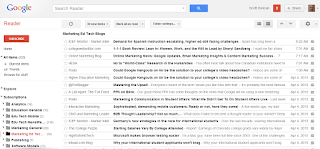Half an Hour,
Jun 09, 2021
 |
| Google Reader - source |
Responding to Mark Berthelemy.
RSS was essentially disappeared because there wasn't a good business model for commercialization. Centralized social networks work much better for user tracking and link promotion. But they lose this advantage if they support RSS.
That's why, for example, when Google was trying to build the audience for Google+, it discontinued its RSS reader. It also discontinued RSS on YouTube (it was very quietly restored a couple of years ago). Similarly, that's why you still can't get RSS feeds from Twitter without an adapter (like RSS.app) or at all from Facebook platforms.
We're seeing the same trend play out, years later, with podcasts. These, like RSS, are openly accessible and decentralized. However, over the last year or so, Spotify has been buying out most of the popular podcast listening applications (known as 'podcatchers') and converting then to a centralized user-login model.
Like Apple has been doing for years, Spotify wants to create a market for fee-based subscription content, which it can only create by making it harder to access free and open content, and building user tracking and content promotion.
Google's recent interest in RSS, where they are experimenting with a feed reader bundled into Chrome, has the same objective. Most users are logged in (and therefore tracked) while they are using Chrome. Google wants to add 'private feeds' that require subscription fees. The browser essentially provides the centralization needed to make RSS commercially viable.
I think this is Google's response to another form of open and decentralized content distribution: paid email newsletters. Services like Patreon and Substack are enabling content producers to stay outside social networks and directly reach (and monetize) readers. This was a service FeedBurner also used to provide, but Google has discontinued Feedburner email subscriptions.
It also allows Google to respond to Spotify and Apple by enabling users to listen to podcasts though the same Chrome interface. HTML already supports audio and video, and it is trivial for Google to enable content distributed through podcasts to play on the browser platform. YouTube Music is poor substitute for the discontinued Google Music, but a feed-based music subscription service through Chrome may be more satisfying and would be a much more effective marketing vehicle for live events and specialized subscription content.
In all cases the business model is created by placing an essential service between the content producer and the end user. This allows them to shape traffic to the user in a way that benefits advertising partners, and to extract a percentage from payments from the user to the producer.
However, this business model is created by undermining the ability of the user to shape their own traffic and to do so without being tracked. It also undermines the viability of free content by creating costs for producers. People who produce free content don't but advertisements or pay for preferential placement. They're also less able to meet the increasing technical demand placed on them by the platform.
RSS survived being disappeared because it continued to perform a valuable service for the people that used it, and because platforms remained available to create and consume RSS content. It's less clear that it will survive being co-opted by the browser-as-social-network.
Mentions
- Mozilla Wants to Put Social Networks in the Browser | WIRED, Jun 09, 2021, - A browser based social network , Jun 09, 2021
, - Flock (web browser) - Wikipedia, Jun 09, 2021
, - Pilot Browser Branded browser for Chinese social network – Macte! Labs, Jun 09, 2021
, - , Jun 09, 2021
, - , Jun 09, 2021
, - Mark Berthelemy on LinkedIn: I'm really interested to understand why RSS (Web feeds) seems to have | 17 comments , Jun 09, 2021
, - RSS is undead – TechCrunch, Jun 09, 2021
, - Google closes the book on Reader, announces July 1 sunset - CNET, Jun 09, 2021
, - YouTube & Feeds even work anymore? [#2471955] | Drupal.org, Jun 09, 2021
, - Find RSS Feed URLs for YouTube Channels and YouTube Playlist - YouTube Tip Tutorial - YouTube, Jun 09, 2021
, - Create YouTube RSS Feeds, Jun 09, 2021
, - , Jun 09, 2021
, - How Spotify Makes Money: Premium Service and Ad-Supported Service, Jun 09, 2021
, - Google revives RSS – TechCrunch, Jun 09, 2021
, - Email-Newsletter Start-ups and The Future of Media - The Atlantic, Jun 09, 2021
, - Upcoming changes to FeedBurner | Google Search Central Blog, Jun 09, 2021
, - Google Play Music to shut down starting in September, will disappear by December – TechCrunch, Jun 09, 2021
, - RSS and the Browser As Social Network, Jun 09, 2021



